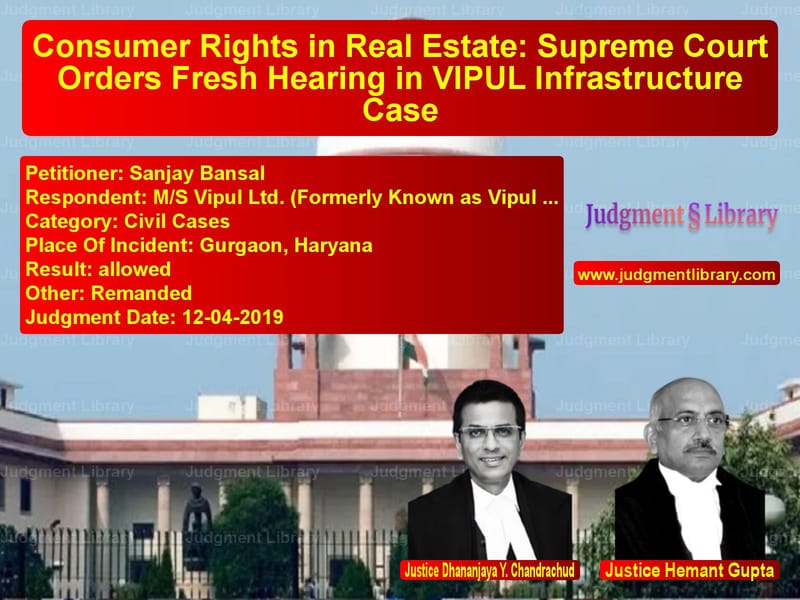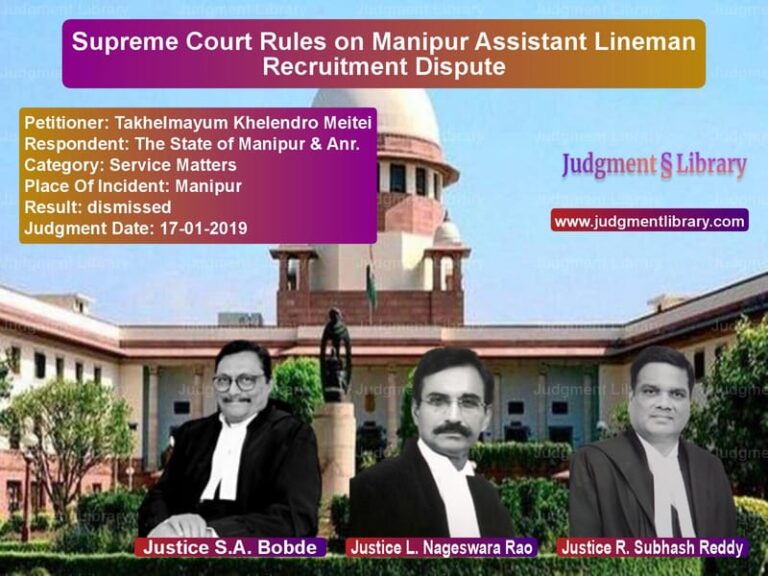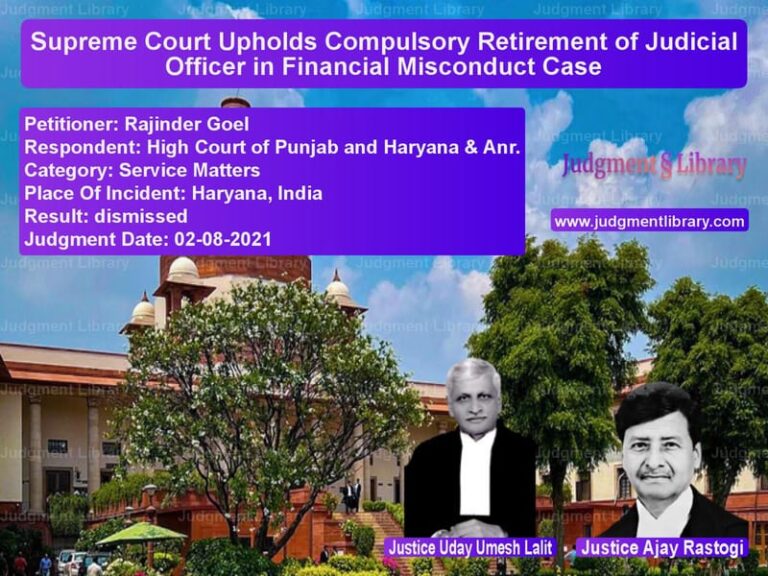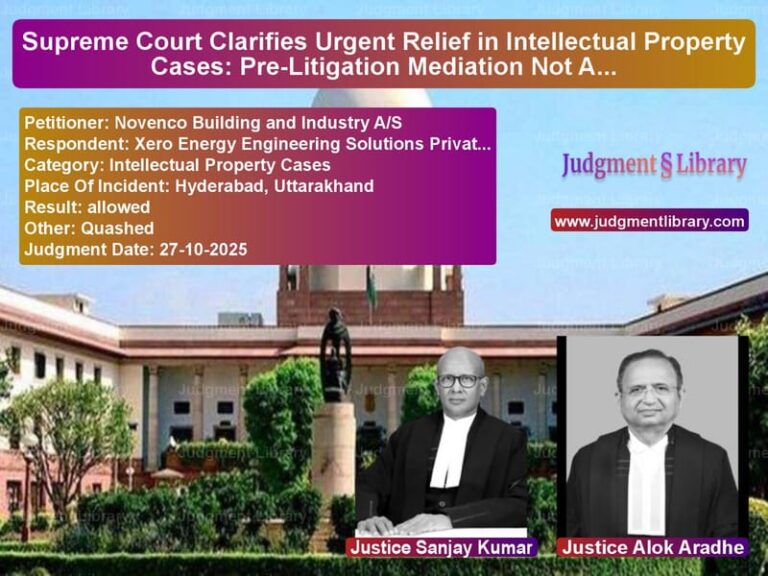Consumer Rights in Real Estate: Supreme Court Orders Fresh Hearing in VIPUL Infrastructure Case
The Supreme Court of India, in its judgment dated April 12, 2019, addressed a crucial issue concerning consumer rights in real estate transactions in the case of Sanjay Bansal vs. M/S Vipul Ltd.. The case revolved around whether the appellant, who had booked four flats in a residential project, qualified as a ‘consumer’ under the Consumer Protection Act, 1986. The Supreme Court set aside the ruling of the National Consumer Disputes Redressal Commission (NCDRC) and ordered a fresh hearing on the matter.
Background of the Case
The appellant, Sanjay Bansal, had booked four flats in the residential project ‘Orchid Petals’ located in Sector 49, Gurgaon, developed by Vipul Infrastructure Developers Ltd.. Alleging a deficiency in service, he filed a consumer complaint before the NCDRC, seeking the following reliefs:
- Execution of the buyer’s agreement/sale deed for the four flats.
- Payment of Rs. 5 lakhs as compensation for harassment and mental agony.
- Reimbursement of the cost of proceedings.
The respondents objected to the complaint, arguing that since the appellant had booked four flats, his purpose was resale and commercial gain. They contended that he did not qualify as a ‘consumer’ under Section 2(1)(d) of the Consumer Protection Act, 1986.
Arguments by the Respondents
- The developer, Vipul Ltd., argued that Sanjay Bansal had booked multiple flats purely for investment and commercial resale.
- They claimed that a person who buys property for commercial purposes does not fall under the definition of a ‘consumer’ under the Act.
- Their key argument was that booking multiple flats clearly indicated an intent to resell for profit, rather than for personal residential use.
Arguments by the Appellant
- The appellant contended that he had booked the flats not for commercial gain but for the use of his family members.
- He argued that the NCDRC had assumed his intention without any concrete evidence.
- He presented financial records showing that he was a successful entrepreneur and had the financial capacity to purchase the flats for personal use.
NCDRC’s Ruling
The NCDRC dismissed the consumer complaint, holding that Sanjay Bansal was not a ‘consumer’ under the Act. It based its ruling on the following observations:
- The fact that the appellant had booked four flats indicated an intention to resell for profit.
- The appellant failed to provide details of the family members for whom he had allegedly booked the flats.
- All agreements for the flats were signed solely by the appellant, with no co-applicants.
- The appellant had booked the flats at a time when the project had not yet received necessary approvals, which further suggested a commercial intent.
Supreme Court’s Observations
The Supreme Court disagreed with the NCDRC’s conclusions, stating that the forum had made an arbitrary presumption without sufficient evidence. The key observations were:
- Number of flats booked is not conclusive proof: The mere fact that the appellant booked four flats does not automatically imply commercial intent.
- Intent needs to be established through evidence: The court emphasized that whether a buyer is a ‘consumer’ should be determined after considering all relevant evidence.
- Bonafide investment in a project: The court noted that investing in an under-construction project does not necessarily imply commercial motives.
- Family usage argument: The appellant’s failure to initially disclose details of his family members was relevant but not conclusive proof of commercial intent.
Final Judgment
- The Supreme Court set aside the NCDRC’s decision.
- It ordered that the consumer complaint be restored and reconsidered after hearing both parties and allowing them to present evidence.
- It directed that the issue of whether the appellant is a consumer be decided along with the merits of the complaint.
- The court permitted Vipul Ltd. to file a written statement and contest the proceedings.
Legal Implications
- This ruling clarifies that the number of units purchased in a real estate project is not the sole determining factor for consumer protection eligibility.
- It emphasizes that intent behind the purchase must be proven through proper evidence, rather than being presumed.
- The judgment ensures that real estate developers cannot evade consumer protection laws merely by claiming that a buyer intended to resell the property.
- It reaffirms the principle that consumer forums must base decisions on evidence rather than assumptions.
Conclusion
The Supreme Court’s decision in this case is a crucial step in ensuring fairness in real estate disputes under consumer protection laws. By emphasizing the need for proper evidence and preventing arbitrary conclusions, the judgment upholds the rights of homebuyers against potential misrepresentation by real estate developers. The ruling sends a clear message that mere assumptions about a buyer’s intent cannot be used to deny consumer rights, and every case must be examined based on its individual merits.
Petitioner Name: Sanjay Bansal.Respondent Name: M/S Vipul Ltd. (Formerly Known as Vipul Infrastructure Developers Ltd.) & Anr..Judgment By: Justice Dhananjaya Y. Chandrachud, Justice Hemant Gupta.Place Of Incident: Gurgaon, Haryana.Judgment Date: 12-04-2019.
Don’t miss out on the full details! Download the complete judgment in PDF format below and gain valuable insights instantly!
Download Judgment: Sanjay Bansal vs MS Vipul Ltd. (Form Supreme Court of India Judgment Dated 12-04-2019.pdf
Direct Downlaod Judgment: Direct downlaod this Judgment
See all petitions in Consumer Rights
See all petitions in Property Disputes
See all petitions in Judgment by Dhananjaya Y Chandrachud
See all petitions in Judgment by Hemant Gupta
See all petitions in allowed
See all petitions in Remanded
See all petitions in supreme court of India judgments April 2019
See all petitions in 2019 judgments
See all posts in Civil Cases Category
See all allowed petitions in Civil Cases Category
See all Dismissed petitions in Civil Cases Category
See all partially allowed petitions in Civil Cases Category







